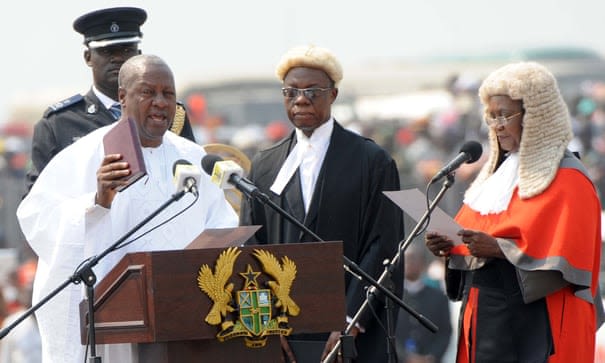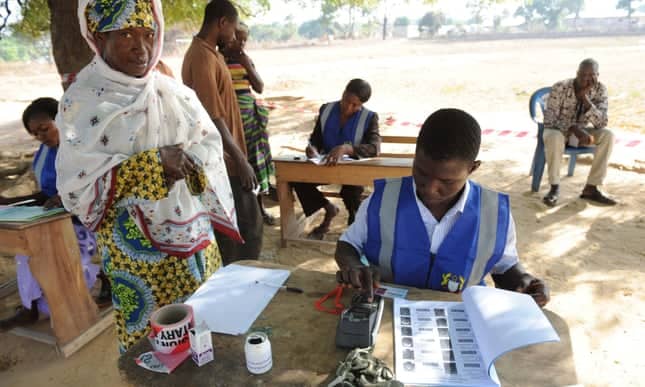Guest post for The Guardian.
Can democracy lead to development, or is it the other way around? The question remains far from settled, and the stakes have never been higher. Most countries today are formal democracies; two out of every three people live in such countries. Yet, there is growing disillusionment about the way democracy works, and concerns about whether it can deliver in terms of social and economic wellbeing. The phenomenal success of countries like China and other “Asian tigers” in lifting people out of poverty has also increased the appeal of authoritarian models of development.
This is what makes the case of Ghana so compelling. Over the past two decades, it has experienced one of the world’s most successful transitions to multiparty democracy, and it is one of the few democracies emerging from the “third wave” of democratisation that has taken root. This is no small achievement, especially in a multi-ethnic setting.
Since 1992, the country has held six elections, and power has been transferred from government to the opposition on two occasions. It has also experienced what several observers call an explosion of political voice, with the growth of an active and engaged civil society that includes professional associations, NGOs, unions, thinktanks and the media.
At the same time, the provision of basic services, especially health and education, has improved dramatically. In 2003, Ghana became one of only a handful of countries not part of the Organisation for Economic Cooperation and Development (OECD) to provide free and universal health coverage (under the National Health Insurance Scheme); and between 1998 and 2008 child immunisation rates soared from 19% to 70%. In 2007, it became the first country in sub-Saharan Africa to make pre-primary education compulsory, and the number of kindergartens doubled from 6,321 to 13,263 between 2001-02 and 2010-11.
According to research from Afrobarometer, three out of four Ghanaians are satisfied with the quality of their country’s democracy and what it can deliver – an approval rating that would be the envy of many other countries.
What has driven this progress in political voice, health and education in Ghana?
Ghana’s progress is rooted, in part, in its history, and in particular in the way that state-society relations have evolved over time and the nature of political competition, as well as in the kind of socioeconomic transformation that the country has experienced since independence.
Ghana has a long history of tolerance and accommodation. State formation processes and state-society relations based on the promotion of social cohesion and a unified “Ghanaian identity” emerged early on, and the notion of a social contract linking state and citizens has been an integral part of its state-and-nation-building project from the start. Leaders and both formal and informal institutions have fostered inclusion and incorporation in ways that transcend narrower ties based on kinship or ethnicity. And an expanding, more urban, and increasingly educated middle class has been actively engaged in political processes and is deeply committed to the country’s democratic values.

Ghana’s President John Dramani Mahama, left, takes the oath of office in Accra in January 2013. Photograph: Pius Utomi Ekpei/AFP/Getty Images
There is also evidence that different elements of Ghana’s newly established democracy have reinforced or even accelerated progress on health and education over the past 10 years. Elections are one such example: clientelism – the exchange of goods and services for political support – is not the decisive factor that determines who people will vote for. They want their members of parliament to deliver public and collective goods, and our research finds that the votes of Ghana’s poor are just as focused on the performance of elected representatives as those of the more educated urban middle classes. Citizens’ expectations about service delivery and the provision of health and education have made these sectors electoral battlegrounds, and have been crucial in lowering their costs and expanding access to them.
Another example is Ghana’s oversight committees in parliament, which have the right to subpoena, supervise and monitor government decisions, particularly in health and education, thereby opening up policy formulation to the public and Ghana’s thriving thinktanks. Their hearings have attracted growing audiences since they began to be televised.
The media in Ghana have been instrumental in pushing for increased accountability and improved service delivery. The 1992 constitution enshrined articles of free speech and, in 2001, a key criminal libel law was repealed under which members of the media had been charged and jailed.
Despite all of this remarkable progress, it is also clear that democracy in Ghana is far from perfect –and there are still many challenges to be addressed.
The nature of the political system remains extremely centralised – including very strong presidential formal powers – and this makes key mechanisms of accountability (especially parliament) very weak. There is still clientelism and corruption.
Election campaigns still tend to focus on more short-term objectives, even if they are oriented towards the provision of public goods. This makes it more difficult for political elites to be willing to undertake more fundamental reforms over the long term, and there are ongoing concerns about the (financial) sustainability of many of the policies that have been introduced, popular – or populist – as they are.
How to make the state accountable through increased democratic space remains a key challenge. There are many examples of political voice making a difference, but there is a real issue of scale – such changes tend to be one-offs and have rarely become systemic.
What needs to change? Politics is all about contesting for power and resources, so these conflicts for power are likely to be endemic. The crucial difference is that in functioning democracies this competition is channelled through a pre-established and publicly accountable framework, and through peaceful mechanisms.
Processes of change are complex, and not always pretty – some of the dynamics prevalent in Ghana do not look any better in more established democracies (look at the US, for example). If the ultimate definition of democracy is “institutionalised uncertainty”, as renowned political scientist Adam Przeworski has defined it, then Ghana seems to be on a good (enough) path, and it has proved that it is a democracy that can deliver, despite challenges and limitations.










